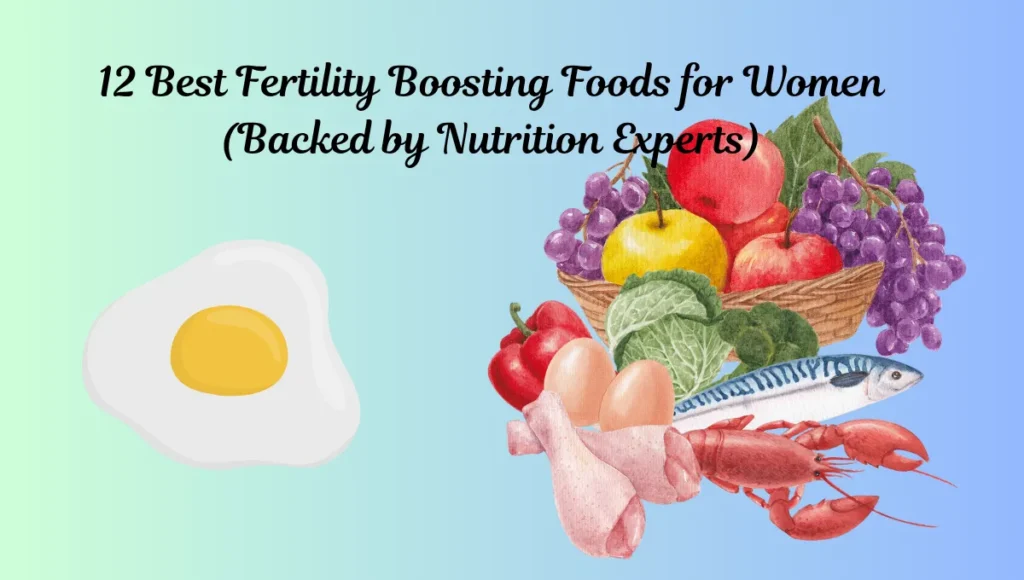12 Best Fertility Boosting Foods for Women (Backed by Nutrition Experts)
Introduction
Struggling with conception can be an emotionally and physically taxing journey for many women. While medical treatments and fertility therapies play a crucial role, the foods you eat every day can also have a profound impact on your reproductive health. Imagine being able to support your fertility naturally—simply by choosing nutrient-rich meals that enhance hormone balance, egg quality, and overall reproductive wellness.
In this guide, we’ll explore the 12 best fertility boosting foods for women, backed by nutrition experts and scientific research. From leafy greens and omega-3-rich fish to antioxidant-packed berries and whole grains, these foods do more than nourish your body—they actively support your journey toward conception.
1.Understanding Female Fertility
a) The Importance of Fertility Health
When we talk about fertility, it’s much more than just the ability to conceive. Female fertility is a reflection of overall reproductive health, which in turn influences general well-being. Whether you’re planning for pregnancy or simply looking to maintain a healthy reproductive system, fertility plays a central role in a woman’s life.
Yet, there are so many myths about fertility that can cause confusion like the idea that fertility only becomes a concern after a certain age, or that lifestyle doesn’t significantly affect it. In reality, fertility is a dynamic balance of several factors, and supporting it through proper care is crucial.
b) Factors Influencing Female Fertility
Fertility isn’t just about what happens in the bedroom.
It’s a blend of biological, lifestyle, and environmental factors.
Biological Factors Age, hormonal balance, and weight play significant roles in reproductive health,
Lifestyle Choices such as stress, exercise, and nutrition are just as influential. For example, high levels of stress or poor diet can disrupt hormonal balance, which is essential for ovulation and conception.
Environmental Influences like exposure to toxins—can further complicate fertility. It’s not all out of your control; making mindful decisions around diet and lifestyle can make a noticeable difference.
c) The Connection Between Diet and Fertility
One of the most powerful ways to support fertility is through fertility boosting foods for women. What we eat directly affects hormone production and the quality of eggs and sperm. Specific vitamins, minerals, and antioxidants found in our diet play critical roles in regulating ovulation and boosting fertility.
There’s a strong connection between dietary patterns and reproductive outcomes whether you’re looking to conceive now or later, a nutrient-rich diet is an essential building block for optimal fertility.
2.Key Nutrients for Enhancing Fertility
a) Essential Vitamins and Their Sources
- Folate: Folate is a key vitamin in reproductive health. It helps to ensure the development of healthy eggs and sperm, reducing the risk of birth defects. Foods like leafy greens, legumes, and fortified grains are rich sources of folate.
- Vitamin D: Vitamin D helps regulate the menstrual cycle and is critical for hormone production. Sources of vitamin D include fatty fish like salmon, egg yolks, and fortified dairy products. In some cases, a vitamin D supplement may be necessary to meet your daily needs.
- Vitamin E: This antioxidant is known to improve egg quality and protect cells from damage. You can find it in nuts, seeds, and green leafy vegetables.
b) Minerals that Support Reproductive Health
- Iron: Adequate iron levels are crucial for healthy ovulation and preventing iron-deficiency anemia, which can impair fertility. Foods like spinach, beans, and lean meats are great sources of iron.
- Zinc: Zinc is involved in hormone production and immune function, both of which are essential for fertility. It’s found in foods like oysters, red meat, poultry, and pumpkin seeds.
- Selenium: Selenium helps protect eggs from oxidative stress and supports the thyroid, which regulates reproductive health. Foods rich in selenium include Brazil nuts, sunflower seeds, and seafood.
c) Healthy Fats and Their Impact
Healthy fats, especially omega-3 fatty acids, are essential for hormone production and overall reproductive health. Omega-3s help to regulate the inflammatory processes that influence ovulation. You can get these healthy fats from foods like avocados, walnuts, chia seeds, and fatty fish such as salmon. On the flip side, avoiding trans fats (found in many processed foods) is crucial as they can harm fertility by disrupting hormone production.
3.Fertility-Boosting Foods
Fertility boosting foods for women must be rich in vitamins and antioxidants can naturally improve reproductive health and increase chances of conception.
a) Whole Grains and Legumes
Whole grains and legumes are more than just healthy; they help balance blood sugar and provide consistent energy, which is crucial for maintaining hormonal balance. Brown rice, quinoa, lentils, and chickpeas are excellent choices for keeping your hormones in check.
b) Detailed Breakdown of Each Food (Fruits and Vegetables)
fruits and vegetables packed with antioxidants, fruits and vegetables support the body in fighting oxidative stress, which can damage eggs and sperm
Spinach – Rich in folate and antioxidants, spinach helps improve sperm quality and motility. Toss it into salads or blend it into smoothies for an easy addition to your diet.
Walnuts – Rich in omega-3 fatty acids and antioxidants, walnuts are excellent for improving sperm function and motility. Snack on them or sprinkle them over your morning oatmeal.
Salmon – This fatty fish is loaded with omega-3s, which promote healthy sperm production. Grill, bake, or sauté it for a flavorful and fertility-friendly meal.
Eggs – A powerhouse of vitamins, minerals, and protein, eggs provide nutrients like vitamin D, which supports sperm function. Add eggs to your breakfast, salads, or snacks.
Oysters – Known for their high zinc content, oysters support testosterone production. Add them to your diet for a fertility boost.
Avocados – High in healthy fats and vitamin E, avocados help maintain healthy sperm membranes. Add them to your meals in sandwiches, salads, or simply as a topping.
Berries – Blueberries, strawberries, and raspberries are full of antioxidants that protect sperm from oxidative damage. Enjoy them fresh or in smoothies.
Seeds – Packed with zinc, pumpkin seeds support testosterone production and overall sperm health. Add them to your salads, yogurt, or eat them as a snack.
Dark Chocolate – A small amount of dark chocolate is rich in antioxidants and can help improve sperm quality. Just be sure to enjoy it in moderation.
Olive Oil – Full of healthy fats and antioxidants, olive oil supports reproductive health. Use it in dressings, for sautéing, or as a drizzle on vegetables.
Garlic – Known for its ability to reduce oxidative stress, garlic is also linked to improved sperm quality. Add it to sauces, salads, or roasted dishes.
c) Dairy and Fermented Foods
The calcium and probiotics found in dairy and fermented foods support reproductive health by promoting hormone balance and improving gut health, which is linked to overall well-being. Look for sources of dairy like yogurt, kefir, and cheese, or try fermented vegetables like kimchi and sauerkraut to support gut health.
4. Foods and Habits to Avoid
a) Processed Foods and Sugar
Sugar and processed foods can wreak havoc on fertility by contributing to insulin resistance and hormonal imbalances. Reducing your intake of sugary snacks, sugary beverages, and processed snacks can make a huge difference. Instead, reach for whole fruits, nuts, or dark chocolate to satisfy your cravings in a more fertility-friendly way.
b) Caffeine and Alcohol Consumption
Excessive caffeine consumption can interfere with fertility by affecting ovulation and hormone levels. If you’re trying to conceive, aim to limit caffeine intake to 200 milligrams per day (roughly one 12-ounce cup of coffee). Alcohol can also affect fertility by disrupting hormonal balance, so moderation is key. Enjoy social occasions, but be mindful of your limits.
c) Trans Fats and Their Risks
Trans fats, which are often found in processed and fried foods, are known to interfere with insulin sensitivity and hormone production. Avoiding foods like fast food, packaged baked goods, and margarine can significantly reduce your risk of hormonal imbalances that hinder fertility.
Tips for Incorporating These Foods into Your Diet
It’s easy to incorporate these fertility boosting foods for women into your meals. Try prepping your meals with a variety of these ingredients to ensure you’re getting a balanced nutrient profile. Grocery shopping for fresh produce, nuts, seeds, and healthy fats will set you up for success.
Summary
A fertility-friendly diet is all about making mindful choices and gradually incorporating nutrient-rich foods into your routine. With these simple changes, you can improve your ovum health, support your overall well-being, and pave the way for better reproductive outcomes.
Pregnancy Planner to identify your most fertile days and optimize your chances of conception — a simple yet powerful tool for those trying to conceive. Always consult with a healthcare provider to tailor these tips to your specific needs.
FAQs
- What are the best fertility boosting foods for women?
Leafy greens, fatty fish, eggs, berries, nuts, and whole grains are top fertility boosting foods for women.
- How do fertility boosting foods for women improve fertility?
They support hormone balance, ovulation, and egg quality through essential nutrients.
- Can fertility boosting foods for women increase chances of pregnancy?
Yes, Fertility boosting foods for women help balance hormones, support ovulation, and enhance overall reproductive wellness. they enhance reproductive health and improve chances of conception.
- How long to see results from fertility boosting foods for women?
Usually 2 to 3 months of consistent healthy eating.
- Should I eat fertility boosting foods for women during pregnancy?
Yes, many are beneficial for both fertility and pregnancy health.
- What foods should be avoided when focusing on fertility boosting foods for women?
Avoid trans fats, processed sugars, excess caffeine, and alcohol.
References
- Harvard Health Publishing. Nutrition and Fertility: Foods That Help Women Conceive.
https://www.health.harvard.edu/womens-health/nutrition-and-fertility - Mayo Clinic. Female Infertility – Causes, Symptoms, and Diet Recommendations.
https://www.mayoclinic.org/healthy-lifestyle/getting-pregnant/in-depth/female-infertility/art-20047390 - Medical News Today. Best Foods for Female Fertility.
https://www.medicalnewstoday.com/articles/323371 - American College of Obstetricians and Gynecologists (ACOG). Nutrition and Fertility Guidance for Women.
https://www.acog.org/womens-health/faqs/nutrition-during-preconception - Verywell Family. Dietary Tips to Improve Female Fertility Naturally.
https://www.verywellfamily.com/fertility-diet-and-nutrition-5185465 - NIH – National Center for Biotechnology Information (NCBI). Impact of Diet and Micronutrients on Female Fertility.
https://www.ncbi.nlm.nih.gov/pmc/articles/PMC6412701/ - The Fertility Diet Blog. Foods to Enhance Women’s Reproductive Health.
https://www.fertilitysmarts.com/blog/fertility-boosting-foods-for-women


